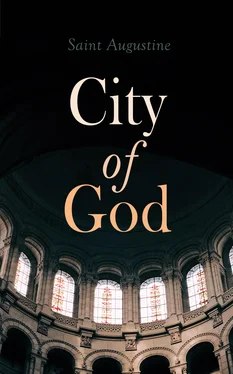Saint Augustine - City of God
Здесь есть возможность читать онлайн «Saint Augustine - City of God» — ознакомительный отрывок электронной книги совершенно бесплатно, а после прочтения отрывка купить полную версию. В некоторых случаях можно слушать аудио, скачать через торрент в формате fb2 и присутствует краткое содержание. Жанр: unrecognised, на английском языке. Описание произведения, (предисловие) а так же отзывы посетителей доступны на портале библиотеки ЛибКат.
- Название:City of God
- Автор:
- Жанр:
- Год:неизвестен
- ISBN:нет данных
- Рейтинг книги:3 / 5. Голосов: 1
-
Избранное:Добавить в избранное
- Отзывы:
-
Ваша оценка:
- 60
- 1
- 2
- 3
- 4
- 5
City of God: краткое содержание, описание и аннотация
Предлагаем к чтению аннотацию, описание, краткое содержание или предисловие (зависит от того, что написал сам автор книги «City of God»). Если вы не нашли необходимую информацию о книге — напишите в комментариях, мы постараемся отыскать её.
City of God — читать онлайн ознакомительный отрывок
Ниже представлен текст книги, разбитый по страницам. Система сохранения места последней прочитанной страницы, позволяет с удобством читать онлайн бесплатно книгу «City of God», без необходимости каждый раз заново искать на чём Вы остановились. Поставьте закладку, и сможете в любой момент перейти на страницу, на которой закончили чтение.
Интервал:
Закладка:
9. Of the reasons for administering correction to bad and good together.
What, then, have the Christians suffered in that calamitous period, which would not profit every one who duly and faithfully considered the following circumstances? First of all, they must humbly consider those very sins which have provoked God to fill the world with such terrible disasters; for although they be far from the excesses of wicked, immoral, and ungodly men, yet they do not judge themselves so clean removed from all faults as to be too good to suffer for these even temporal ills. For every man, however laudably he lives, yet yields in some points to the lust of the flesh. Though he do not fall into gross enormity of wickedness, and abandoned viciousness, and abominable profanity, yet he slips into some sins, either rarely or so much the more frequently as the sins seem of less account. But not to mention this, where can we readily find a man who holds in fit and just estimation those persons on account of whose revolting pride, luxury, and avarice, and cursed iniquities and impiety, God now smites the earth as His predictions threatened? Where is the man who lives with them in the style in which it becomes us to live with them? For often we wickedly blind ourselves to the occasions of teaching and admonishing them, sometimes even of reprimanding and chiding them, either because we shrink from the labour or are ashamed to offend them, or because we fear to lose good friendships, lest this should stand in the way of our advancement, or injure us in some worldly matter, which either our covetous disposition desires to obtain, or our weakness shrinks from losing. So that, although the conduct of wicked men is distasteful to the good, and therefore they do not fall with them into that damnation which in the next life awaits such persons, yet, because they spare their damnable sins through fear, therefore, even though their own sins be slight and venial, they are justly scourged with the wicked in this world, though in eternity they quite escape punishment. Justly, when God afflicts them in common with the wicked, do they find this life bitter, through love of whose sweetness they declined to be bitter to these sinners.
If any one forbears to reprove and find fault with those who are doing wrong, because he seeks a more seasonable opportunity, or because he fears they may be made worse by his rebuke, or that other weak persons may be disheartened from endeavouring to lead a good and pious life, and may be driven from the faith; this man's omission seems to be occasioned not by covetousness, but by a charitable consideration. But what is blameworthy is, that they who themselves revolt from the conduct of the wicked, and live in quite another fashion, yet spare those faults in other men which they ought to reprehend and wean them from; and spare them because they fear to give offence, lest they should injure their interests in those things which good men may innocently and legitimately use,—though they use them more greedily than becomes persons who are strangers in this world, and profess the hope of a heavenly country. For not only the weaker brethren, who enjoy married life, and have children (or desire to have them), and own houses and establishments, whom the apostle addresses in the churches, warning and instructing them how they should live, both the wives with their husbands, and the husbands with their wives, the children with their parents, and parents with their children, and servants with their masters, and masters with their servants,—not only do these weaker brethren gladly obtain and grudgingly lose many earthly and temporal things on account of which they dare not offend men whose polluted and wicked life greatly displeases them; but those also who live at a higher level, who are not entangled in the meshes of married life, but use meagre food and raiment, do often take thought of their own safety and good name, and abstain from finding fault with the wicked, because they fear their wiles and violence. And although they do not fear them to such an extent as to be drawn to the commission of like iniquities, nay, not by any threats or violence soever; yet those very deeds which they refuse to share in the commission of, they often decline to find fault with, when possibly they might by finding fault prevent their commission. They abstain from interference, because they fear that, if it fail of good effect, their own safety or reputation may be damaged or destroyed; not because they see that their preservation and good name are needful, that they may be able to influence those who need their instruction, but rather because they weakly relish the flattery and respect of men, and fear the judgments of the people, and the pain or death of the body; that is to say, their non-intervention is the result of selfishness, and not of love.
Accordingly, this seems to me to be one principal reason why the good are chastised along with the wicked, when God is pleased to visit with temporal punishments the profligate manners of a community. They are punished together, not because they have spent an equally corrupt life, but because the good as well as the wicked, though not equally with them, love this present life; while they ought to hold it cheap, that the wicked, being admonished and reformed by their example, might lay hold of life eternal. And if they will not be the companions of the good in seeking life everlasting, they should be loved as enemies, and be dealt with patiently. For so long as they live, it remains uncertain whether they may not come to a better mind. These selfish persons have more cause to fear than those to whom it was said through the prophet, "He is taken away in his iniquity, but his blood will I require at the watchman's hand."46 For watchmen or overseers of the people are appointed in churches, that they may unsparingly rebuke sin. Nor is that man guiltless of the sin we speak of, who, though he be not a watchman, yet sees in the conduct of those with whom the relationships of this life bring him into contact, many things that should be blamed, and yet overlooks them, fearing to give offence, and lose such worldly blessings as may legitimately be desired, but which he too eagerly grasps. Then, lastly, there is another reason why the good are afflicted with temporal calamities—the reason which Job's case exemplifies: that the human spirit may be proved, and that it may be manifested with what fortitude of pious trust, and with how unmercenary a love, it cleaves to God.47
10. That the saints lose nothing in losing temporal goods.
These are the considerations which one must keep in view, that he may answer the question whether any evil happens to the faithful and godly which cannot be turned to profit. Or shall we say that the question is needless, and that the apostle is vapouring when he says, "We know that all things work together for good to them that love God?"48
They lost all they had. Their faith? Their godliness? The possessions of the hidden man of the heart, which in the sight of God are of great price?49 Did they lose these? For these are the wealth of Christians, to whom the wealthy apostle said, "Godliness with contentment is great gain. For we brought nothing into this world, and it is certain we can carry nothing out. And having food and raiment, let us be therewith content. But they that will be rich fall into temptation and a snare, and into many foolish and hurtful lusts, which drown men in destruction and perdition. For the love of money is the root of all evil; which, while some coveted after, they have erred from the faith, and pierced themselves through with many sorrows."50
They, then, who lost their worldly all in the sack of Rome, if they owned their possessions as they had been taught by the apostle, who himself was poor without, but rich within,—that is to say, if they used the world as not using it,—could say in the words of Job, heavily tried, but not overcome: "Naked came I out of my mother's womb, and naked shall I return thither: the Lord gave, and the Lord hath taken away; as it pleased the Lord, so has it come to pass: blessed be the name of the Lord."51 Like a good servant, Job counted the will of his Lord his great possession, by obedience to which his soul was enriched; nor did it grieve him to lose, while yet living, those goods which he must shortly leave at his death. But as to those feebler spirits who, though they cannot be said to prefer earthly possessions to Christ, do yet cleave to them with a somewhat immoderate attachment, they have discovered by the pain of losing these things how much they were sinning in loving them. For their grief is of their own making; in the words of the apostle quoted above, "they have pierced themselves through with many sorrows." For it was well that they who had so long despised these verbal admonitions should receive the teaching of experience. For when the apostle says, "They that will be rich fall into temptation," and so on, what he blames in riches is not the possession of them, but the desire of them. For elsewhere he says, "Charge them that are rich in this world, that they be not high-minded, nor trust in uncertain riches, but in the living God, who giveth us richly all things to enjoy; that they do good, that they be rich in good works, ready to distribute, willing to communicate; laying up in store for themselves a good foundation against the time to come, that they may lay hold on eternal life."52 They who were making such a use of their property have been consoled for light losses by great gains, and have had more pleasure in those possessions which they have securely laid past, by freely giving them away, than grief in those which they entirely lost by an anxious and selfish hoarding of them. For nothing could perish on earth save what they would be ashamed to carry away from earth. Our Lord's injunction runs, "Lay not up for yourselves treasures upon earth, where moth and rust doth corrupt, and where thieves break through and steal; but lay up for yourselves treasures in heaven, where neither moth nor rust doth corrupt, and where thieves do not break through nor steal: for where your treasure is, there will your heart be also."53 And they who have listened to this injunction have proved in the time of tribulation how well they were advised in not despising this most trustworthy teacher, and most faithful and mighty guardian of their treasure. For if many were glad that their treasure was stored in places which the enemy chanced not to light upon, how much better founded was the joy of those who, by the counsel of their God, had fled with their treasure to a citadel which no enemy can possibly reach! Thus our Paulinus, bishop of Nola,54 who voluntarily abandoned vast wealth and became quite poor, though abundantly rich in holiness, when the barbarians sacked Nola, and took him prisoner, used silently to pray, as he afterwards told me, "O Lord, let me not be troubled for gold and silver, for where all my treasure is Thou knowest." For all his treasure was where he had been taught to hide and store it by Him who had also foretold that these calamities would happen in the world. Consequently those persons who obeyed their Lord when He warned them where and how to lay up treasure, did not lose even their earthly possessions in the invasion of the barbarians; while those who are now repenting that they did not obey Him have learnt the right use of earthly goods, if not by the wisdom which would have prevented their loss, at least by the experience which follows it.
Читать дальшеИнтервал:
Закладка:
Похожие книги на «City of God»
Представляем Вашему вниманию похожие книги на «City of God» списком для выбора. Мы отобрали схожую по названию и смыслу литературу в надежде предоставить читателям больше вариантов отыскать новые, интересные, ещё непрочитанные произведения.
Обсуждение, отзывы о книге «City of God» и просто собственные мнения читателей. Оставьте ваши комментарии, напишите, что Вы думаете о произведении, его смысле или главных героях. Укажите что конкретно понравилось, а что нет, и почему Вы так считаете.












